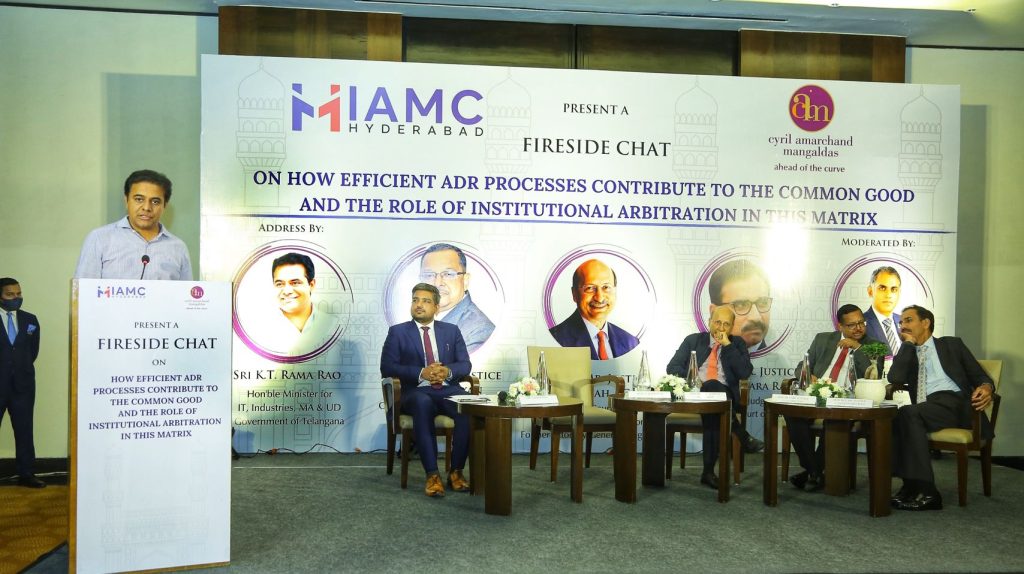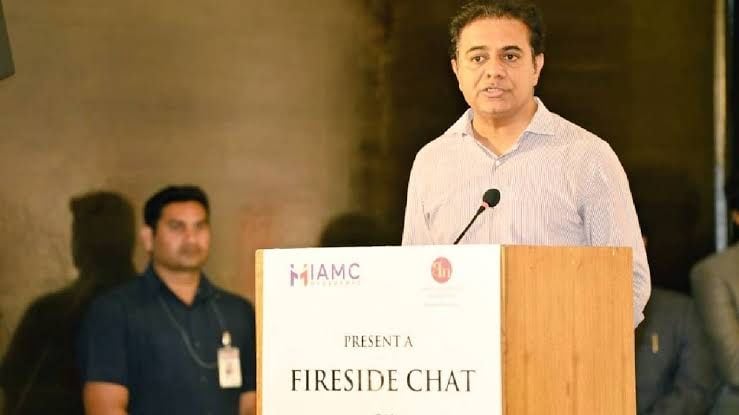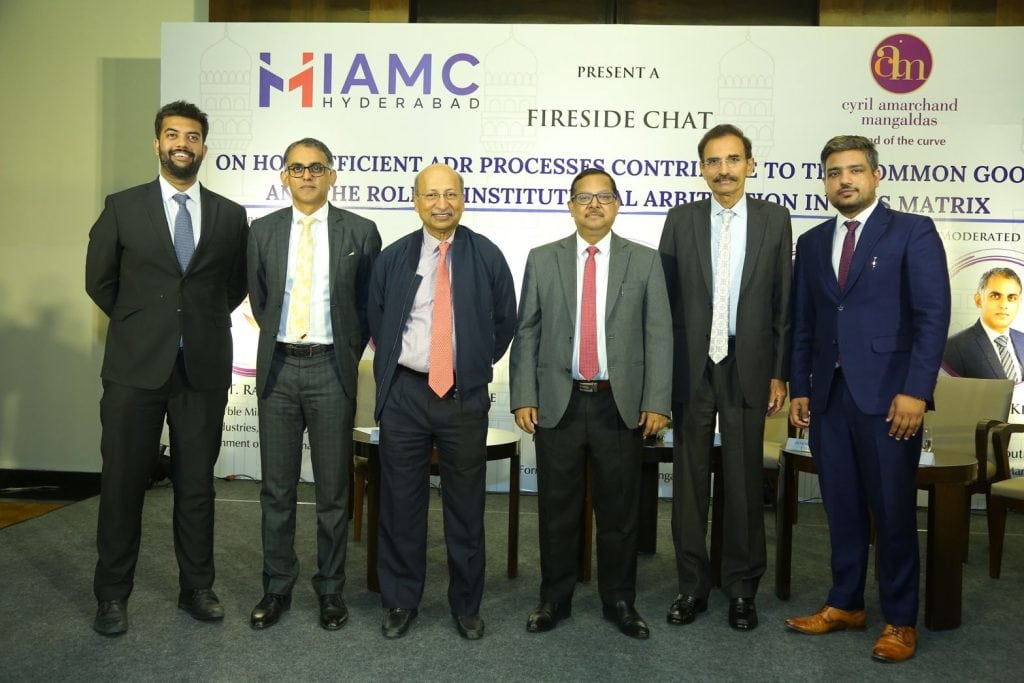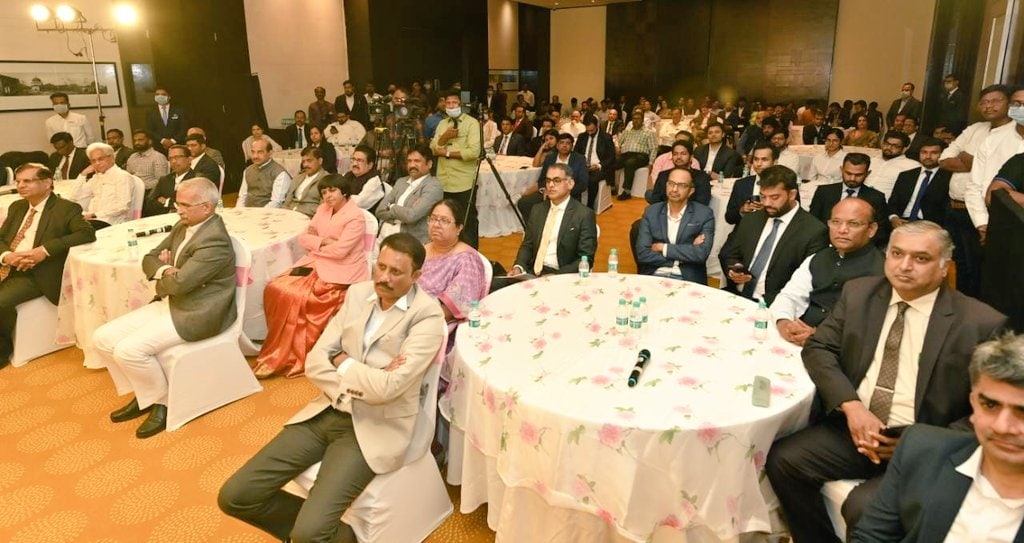Fireside chat on “How efficient ADR processes contribute to the common good and the role of institutional arbitration in this matrix.”
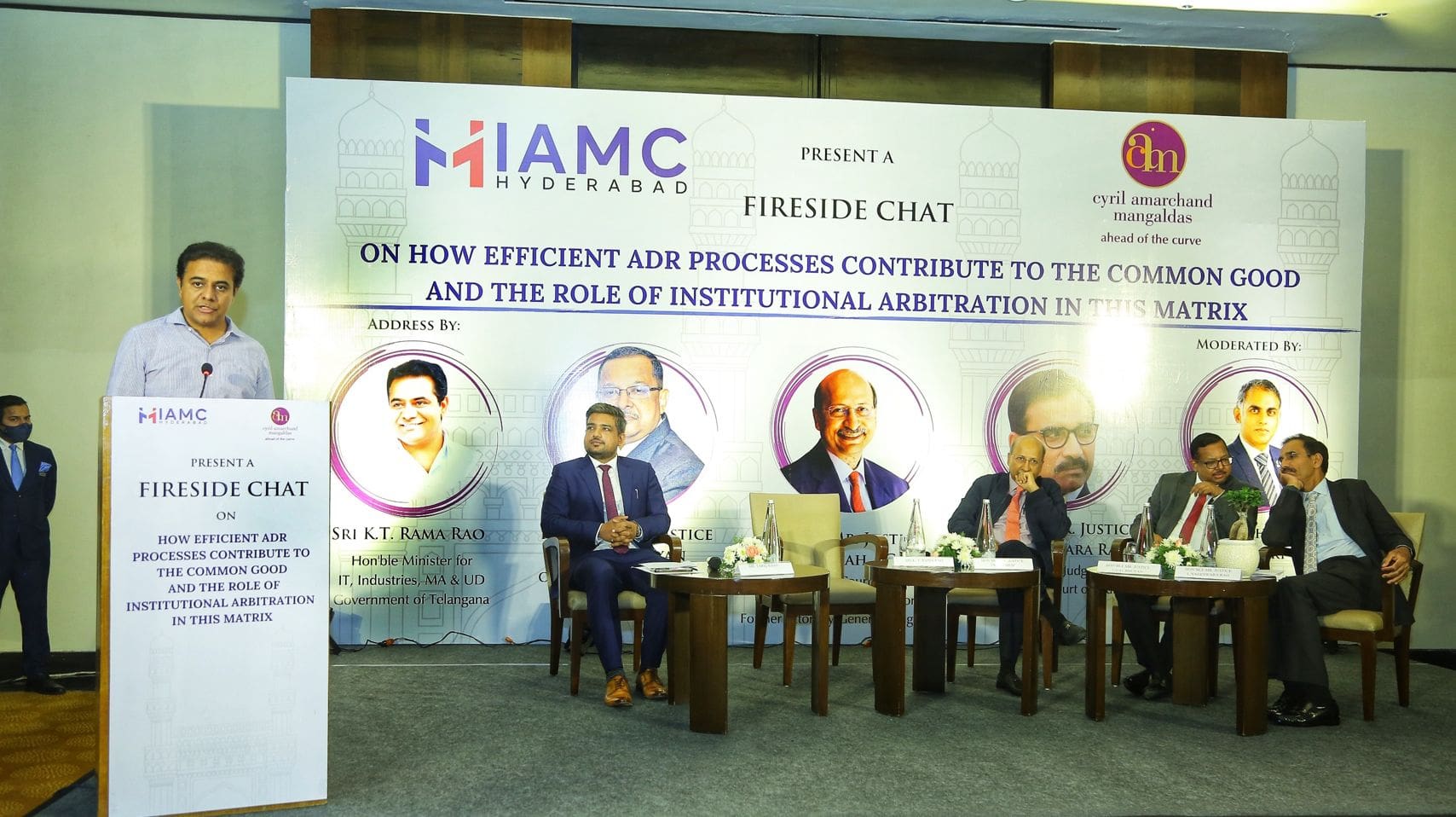
On February 21,2023 the International Arbitration Mediation Centre, Hyderabad organized a discussion on “How efficient ADR processes contribute to the common good and the role of institutional arbitration in this matrix.”. The event witnessed one of the leading arbitrators in the world Mr. VK Rajah, SC former Attorney General of Singapore and Former Judge, Singapore Supreme Court as the special guest, Sri K.T. Rama Rao, Hon’ble Minister for Information Technology, Industries & Commerce, Municipal Administration & Urban Development, Government of Telangana as well as Justices, Ujjal Bhuyan, Chief Justice for the High Court for the State of Telangana, Hon’ble Mr. Justice L Nageswara Rao, Former Judge, Supreme Court of India as panellists. The participants were senior members from various industries, judges from the High court and members from the legal fraternity.
Mr. Tariq Khan, Registrar IAMC delivered the welcome address, taking participants through IAMC, Hyderabad’s one year journey from administering disputes valued at over 500 million USD to supporting the speedy resolution of MSME disputes as well as developing training programmes in mediation for capacity building on behalf of several ministries and organizations.
In his address, Hon’ble Mr. Justice Ujjal Bhuyan noted IAMC’s efforts to slowly but surely, establish itself as a global centre domestically and internationally. He noted that today businesses in India is still in the shadow of governments. When they come out of the shadow and become corporate in the true sense, then parties will seek institutional arbitration. This will strengthen economy and contribute to good governance. By way of example, he mentioned Mr. V.K. Rajah’s interim award in Amazon Future Retail emergency arbitration, which was affirmed by the Supreme Court of India, further building confidence in India as an arbitration friendly jurisdiction and noting that it will help reduce backlog of Section 9 cases.
In his remarks Sri K.T. Rama Rao extended a warm welcome on behalf of the Chief Minister to Mr. VK Rajah on his first visit to Hyderabad, he stressed on the importance not only on the ease of doing business but cost of doing business and quality of doing business.
Vocal in his support of IAMC, the minister stressed upon his government’s investment in dispute resolution in Hyderabad for businesses and the beneficial role IAMC has to play, especially in attracting more investment to the state. Echoing the Registrar’s welcome address, the minister noted that apart from catering to the needs of big businesses the focus should be on the MSME sectors. The minister encouraged IAMC to host more such events and connect with industry bodies to deepen ties and synergies between them.
Subsequently, Mr Lomesh Kiran Nidumiri, Head Disputes, South India, Cyril AmarchandMangaldas, moderated a fireside chat session with Mr. VK Rajah, SC and Justices, Hon’ble Mr. Justice Ujjal Bhuyan Hon’ble Mr. Justice L Nageswara Rao, kicking of with the question of what lessons Singapore may have for India in the ADR space.
Mr. VK Rajah responded noting that it takes a commitment on the part of the State to look at ADR seriously and that on his 1st visit to Hyderabad, Telangana he has been quite impressed. He also noted that there was a need to adopt better dispute resolution systems.
Quoting Mr VK Rajah “An arbitration centre will not become a global hub if you do not address the competence of the judiciary. Looking at global trends towards specialization there needs to be the building of capacities and deep knowledge in the Judiciary”. He suggested that the appointment of amicus’s may lead the way in helping parties build further confidence in courts and also noted that an efficient legal system in Hyderabad is the requirement for arbitration to work. There are many global MNC’s in the city and there is no reason why Hyderabad cannot be a template for good legal systems in India.
Noting that promotion of arbitration culture is a two way street, he also challenged IAMC to set targets and publish them in terms of caseloads and timelines, noting that when the business community knows these are the standards set, things will fall in place. The overarching need however is to develop a premier legal hub, not just a hub for dispute resolution.
The discussion progressed thematically with Justice Ujjal Bhuyan responding to the question of What are efficient systems of ADR as those with the least intervention by courts. “The medium is not as important as the resolution of disputes and that mediation has a major role to play in this regard”.
Justice LN Rao latched onto this point, noting that a change in the mindset of lawyers is needed and that parties need to start accepting arbitral awards and not challenging them. Quoting Justice Roscoe Pound, he raised concerns about the working of the adversarial court system and the theory of Harvard Professor Frank Sanders, Multi door courthouse with multiple doors to choose the method of dispute resolution.
He felt that Meditation has not really taken off in India yet and that the Government must lead the way for others to follow. A mandatory mediation clause in public contracts is the way to change this culture.
Justice Bhuyan concurred noting that we are steeped into adversarial culture and that it was being contemplated that the Judges of the Telangana High Court undergo a mediation course from trained mediators.
Along with ease of doing business, the enforcing contracts is important and there is a need for specialized courts like commercial courts with trained judges. A dedicated arbitration bench at the Telangana HC would send the right signal.
Mr VK Rajah noted that his process of arbitration cannot be just run by lawyers for their own benefit, there is a major role for In House Corporate Counsel to shape the practice of arbitration as per the needs of Industry. It is unfortunate for Indian companies to choose foreign seated arbitrations. He stressed on the need to treat domestic firms and institutions such as IAMC as national assets and that if the IAMC succeeds, everyone shall be a part of that success. A way to nurture such domestic talent would be a world class LLM course in India.
Speaking of developments in the ADR space, globally there has been a mushrooming of arbitration centres. China for example has over 200 of them. Mr Rajah reflecting on this boom felt that there would soon be a downsizing of the same and that it would be difficult for China to become a global arbitration hub despite competent lawyers and judges when compared to India, which benefits from the common law system and familiarity with the English language in relation to international arbitration.
Within the Indian context there is certainly space for two or three arbitration centres, with each playing to its strengths, for example in Hyderabad the resolution of disputes in Pharma and Tech sectors.
Looking at the advances made by Indians in the technology and banking sectors, recently, Mr Rajah rounded up the discussion for the night with the confidence, that if given the right support young Indian arbitration practitioners today will be global thought leaders in international arbitration in the next 10-15 years.
The vote of thanks was delivered by Sharan Kukreja, partner, CAM which was followed by dinner.
